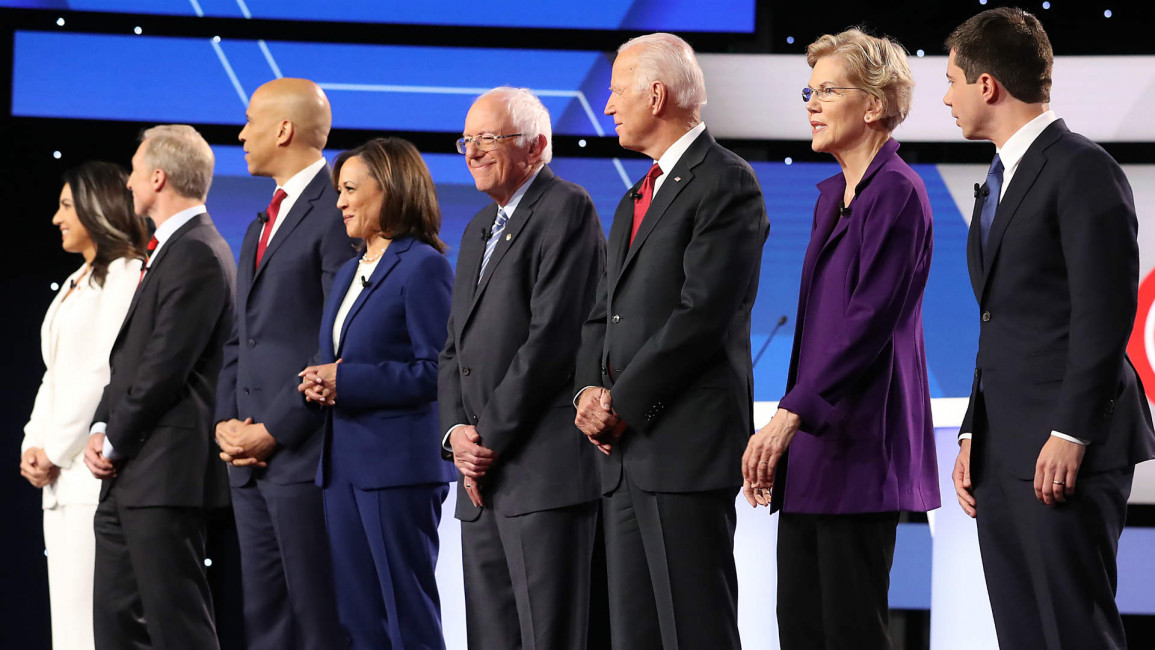Presidential hopeful Elizabeth Warren wants US combat troops to ‘get out’ of Middle East
Warren, who is among the frontrunners to become the Democratic candidate in 2020, said: "I think that we ought to get out of the Middle East", during Tuesday's Democratic primary debate.
The bold remark was later clarified by Warren’s campaign team, who said she was talking about combat troops only, not those in support and non-combat roles.
"She believes we need to end the endless wars. That means working to responsibly remove US troops from combat in the Middle East, and using diplomacy to work with allies and partners to end conflicts and suffering in the region," said the senator’s spokesperson Alexis Krieg.
In-depth: Tulsi loves Assad: How Syria became a US presidential campaign issue
Warren was among several candidates to scorn President Donald Trump's decision to withdraw troops from Syria during the prime-time debate.
'Regime change war'
Hawaii Representative Tulsi Gabbard, who has gained notoriety for her perceived sympathy for Syria's dictator Bashar al-Assad, came under fire for calling Syria eight-year-long conflict a "regime change war".
"The slaughter of the Kurds being done by Turkey is yet another negative consequence of the regime change war that we've been waging in Syria," the Iraq War veteran declared in the debate.
Twitter Post
|
"Donald Trump has the blood of the Kurds on his hand but so do many of the politicians in our country from both parties," she added.
Gabbard's remarks prompted a strong response from rival candidate and fellow veteran Pete Buttigieg, who said: "Respectfully Congresswoman I think that is dead wrong. The slaughter going on in Syria is not a consequence of American presence. It's a consequence of a withdrawal and a betrayal."
"What we are doing or what we were doing in Syria was keeping our word. I would have a hard time today looking an Afghan civilian or soldier in the eye after what just happened over there," he said, referencing his service in Afghanistan.
"It is undermining the honour of our soldiers. You take away the honour of our soldiers, you might as well go after their body armor next," he added.
Trump pull-out
Syria was a hotly contested topic in the debate following the disastrous fall-out of Donald Trump's decision to pull all US troops from northern Syria, where they had been supporting the Kurdish-led SDF militia in the fight against the Islamic State group.
The withdrawal is seen to have green-lighted a Turkish offensive into northern Syria to wrest control from the Kurds, prompting hundreds of thousands to flee.
The operation has forced the out-gunned Kurds to reach a deal with the Syrian regime, allowing Assad’s forces to retake swathes of northeastern provinces.
Twitter Post
|
The hurried withdrawal has also left the question of IS prisons and camps in the balance, with reports that hundreds of detainees have escaped.
Democratic presidential candidate Julian Castro said in Tuesday's debate: "Think about how absurd it is that this president is caging kids on the border and effectively letting ISIS prisoners run free."
US forces, including air and naval forces, have been based in the Middle East for decades, in part to ensure a free flow of oil from countries such as Saudi Arabia that have long been a vital energy source to many Western countries.
The US Navy's 5th Fleet, for example, is headquartered in Bahrain, and the Air Force operates aircraft, including fighter jets, bombers and intelligence-gathering planes, at bases in Qatar, the UAE and Kuwait.
The US also has about 5,200 non-combat troops in Iraq to support Iraqi security forces who were overrun by the Islamic State group in 2014.
The number of US troops in Syria has shrunk this year from about 2,000 to about 1,000, and Trump last week directed the remaining soldiers to leave.
Warren, who serves on the Senate Armed Services Committee, has long argued that the US military is overcommitted in the Middle East and mired in conflicts that sap America's strength.
Read more: Fifteen years after invading Iraq: A mechanical and wilful forgetting
Reducing or ending US involvement in Middle East wars, however, is different than ending the US military presence in the region.
Those forces are intended as a deterrent to US adversaries such as Iran and Russia, and as reassurance to its allies such as Israel.
Ever since President Jimmy Carter in 1980 declared that the US would use force, if necessary, to stop any outside power from gaining control of the Persian Gulf - the so-called Carter Doctrine - America has made that area a key focus of its military strategy.



